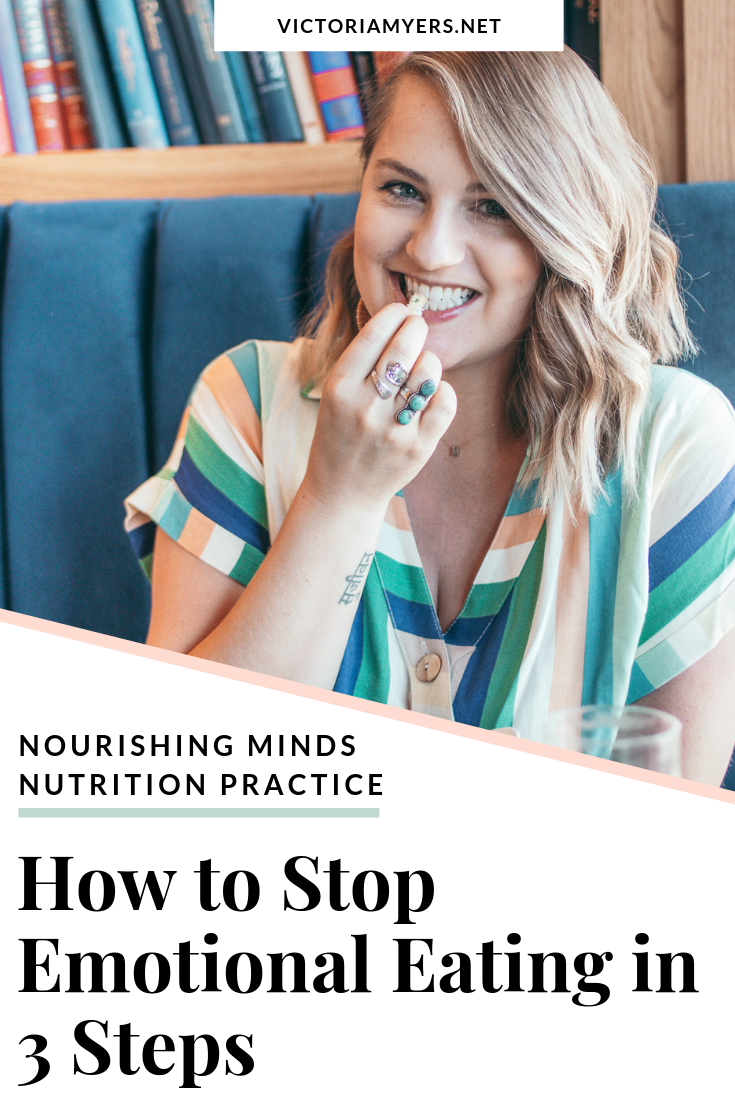How to Stop Emotional Eating in 3 Steps
Many, many people identify themselves as an “emotional eater”.
Do you, too?
Whenever I work with a client who identifies as an emotional eater, this is usually defined by them as eating a large portion of food when they feel (fill in the blank). Usually the emotion involved is a negative emotion- such as anger, sadness, frustration, overwhelm, anxious or hatred (however there are definitely those who will vilify eating out of any emotion, even pleasure, as a bad thing). I never like to generalize because every person has a unique and individual relationship and experience with food, but usually when you identify as an emotional eater it is because:
You see eating, especially emotional eating, as a morally "bad” thing to do. Food to you is only about eating for fuel and nutrition, and all emotions involved with food is a negative thing.
You are avoiding feeling your emotions, and use food as a way to “stuff down” the emotion. The opposite could also be true, where emotions cause you to restrict or refuse to eat when hungry as a way to “punish” yourself or avoid feeling the emotion by fixating on the restriction and “power” you hold over food.
You do not have other coping emotions for their emotions outside of eating or restricting food.
Let’s talk about each of these in detail…
The concept that emotionally eating is a bad thing.
I totally get it if you are reading this blog post and thinking to yourself “but emotionally eating IS a bad thing!”. But here’s the thing: we all eat out of emotion. Food is so much more than nutrition and fuel. Its cultural, social, pleasurable and satisfying too. Food is one of the greatest pleasures in life, and there’s nothing wrong with that!
Demonizing emotional eating as a bad thing negates the fact that we eat out of pleasure, and it is also places morality around food. Thinking of how you eat as right or wrong, good or bad, is 99% of the time going to lead to having all or nothing behaviors around food. And this all or nothing behavior is more than any other thing what will lead to overeating or binge eating (or restrictive eating) when experiencing a negative emotion.
Instead of seeing emotional eating as a bad thing, I encourage you to consider it a neutral concept. By removing the all or nothing mentality towards emotional eating, this can allow for us to enjoy the pleasure of eating and also stop judging ourselves when we do eat out of negative emotions, too.
Avoiding feeling the feels.
Truthfully, this is an issue we all struggle with as a society right now. Instead of feeling our emotions we do anything we can do avoid them. Numb ourselves with social media, exercise, restrict eating or overeat, drink, use drugs…the list could go on and on. Its an issue we all struggle with in a world that only accepts people presenting themselves as happy and doesn’t respect mental health needs.
If you are identifying as an emotional eater (or a restrictive emotional eater) after you remove the good and bad concepts around emotional eating and remove any judgement around yourself if you do choose to eat out of emotions, the next step is to allow yourself to feel the feelings.
Seriously, feel them. Sit with them. Cry it out. Scream into a pillow. Hit something like a punching bag if you need to. I always encourage here to also use journaling to help you identify with what emotion you are feeling and why you are feeling it.
Find tools in your toolbox.
Next up, its time to find emotional coping mechanisms for the emotions you are experiencing. With clients, I call them “tools in the toolbox”.
Food can be one of those tools, but as you begin to explore ways to take care of yourself and cope with emotions, you may find its not as helpful as the other tools or only having one tool doesn’t serve you.
For example, some of my emotional coping mechanisms are:
Going for a walk
Taking a nap
Enjoying a long, hot bath
Drinking a glass of wine while chatting with a girlfriend
Talking out my emotions with my husband
Journaling
Yoga and deep breathing
Eating sweets
When I was younger and struggling with disordered eating and orthorexia, I demonized emotional eating and judged myself so much when I did it. Yet, when I was experiencing a negative emotion, it was one of the few opportunities I gave myself to eat “whatever I wanted”. As a consequence, I would eat sweets in very, very large portions and was still left feeling even worse because I was so upset with myself for eating out of emotion.
These days, when I’m upset or sad about something, I sit with it, feel it, and usually cry a lot (my favorite way to release how I’m feeling). Then, I ask myself the same question I’m suggesting to you to ask yourself, “what do I need in this moment to take care of myself?”. I pull out whatever tool I need in that moment, and overtime as I developed coping mechanisms and embraced intuitive eating, I found food farther and farther on the list. It’s still there, but it’s not my go-to anymore.
When working to discover your tools in your toolbox, I recommend writing them down so you can refer to them as you learn this new skill of having numerous coping mechanisms.
So next time you feel a negative emotion and you want to eat emotionally remember to:
Not demonize emotional eating. If that’s the best way to take care of yourself in that moment than that’s okay. When you have the desire to do so or in any experience like this remember next to:
Feel your feelings. Sit with them. Journal on them. Do whatever it takes to release the emotions. It may be helpful in this step to also talk with a friend, your partner or a therapist or dietitian (for deeper emotional eating issues or restrictive emotional eating).
And then ask yourself, “What would be the best way to take care of myself right now? Which tool of mine would be most supportive in this moment?”
Finally, emotional eating is covered as one of the ten principles of intuitive eating. Learn more about this principle, cope with your emotions without using food, by reading the book and going through the workbook. If you find it challenging or you have more questions, don’t hesitate to work with a dietitian one on one.
Learn more about intuitive eating and emotional eating:
NWP Episode 77: Emotional Eating and Body Dysmorphia
NWP Episode 106: Intuitive Eating Principles, Part 2
Discovering Your Self Worth Outside of Your Weight
Practicing Intuitive Eating in a World Obsessed with Dieting





